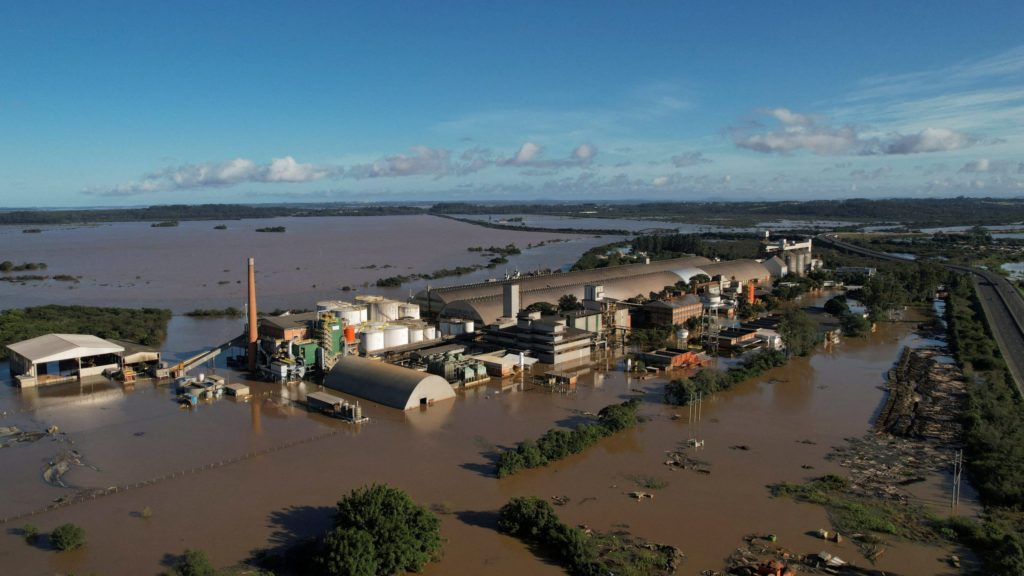The unprecedented storms devastating vast areas in Rio Grande do Sul state in southern Brazil since the end of April have already displaced more than half a million people, which has led to the formation of many solidarity networks.
Members of the Catholic Church, which is playing a central role in aid efforts, are calling on government authorities to develop solid policies to rebuild destroyed communities and family farms that are now unproductive due to the lack of equipment and seeds.
The extent of the damage caused by the floods that impacted 446 cities and towns in the state -- almost 90% of the total number of municipalities in Rio Grande do Sul -- and killed at least 149 people is still unknown. According to the authorities, more than 2 million residents have been affected so far. Almost 80,000 displaced people are staying in public shelters.
"The river levels have gone up again after some days without rain. It's impossible at this point to estimate the losses of families and communities, given that the crisis is not over," Father Edson Thomassim told OSV News.
The priest is a vicar in charge of a community in São Leopoldo, a city in the metropolitan area of Porto Alegre. He said that the first displaced family arrived at his parish May 1. Now, the local church is giving shelter to 80 people. They're housed in a room that used to be a space for spiritual retreats and studies. Local schools, community centers and evangelical churches have opened their doors for impacted families as well.
"We welcomed poor families -- mostly people who collect scrap metal and other materials in order to make a living -- whose houses were near the swollen river," Father Thomassim said of the families his parish hosts, of whom most are Black.
The priest said donations are coming from different parts of the state and also from other regions of Brazil, but there aren't enough volunteers to process and distribute them. Most of the people working in the shelters are tired after three weeks; others had to go back to work.
"The government will have to come up with a strategy for long-term shelters. There aren't houses for rent in the city at this point," Father Thomassim said.
Many displaced people are living in parish houses. Other churches, like the Lutherans, are also coordinating help. Owners of houses that are safe are giving shelter to 20, at times 30 displaced people.
In the capital city, Porto Alegre, where many neighborhoods have been underwater for several days, churches located in higher areas have been accommodating residents of the impacted areas. That's the case of St. Claire Church, headed by Father Rodrigo Cichowicz.
Since the first days of May "our sports hall has been giving shelter to 120 people. Most of them are homeless men and women who were staying at a shelter that was hit by the flood," Father Cichowicz told OSV News.
There's also a group of Venezuelan families -- one of them arrived in Porto Alegre a few days ago -- and even a small number of middle-class people who lost everything due to storms. Almost half of the guests are elderly citizens and children. Volunteers are providing food and medicines. The gym's locker rooms were adapted with showers for the new residents.
"People have to rebuild their lives from scratch. I think our shelter will have to work for at least two months," Father Cichowicz said.
On May 15, President Luiz Inácio Lula da Silva announced the government will make a deposit of $1,000 for 200,000 families impacted by the inundation. Other relief measures will be taken, like the inclusion of 21,000 new families in a governmental assistance program for poor people. Analysts say, however, that long-term policies will be needed to really rebuild the state.
In the rural sphere, the situation is even more complicated, said Franciscan Brother Sergio Görgen, who directs the Small Farmers Movement. One of the major food producers in Brazil, the state of Rio Grande do Sul will deal with the consequences of the floods for a long time, with relevant effects on the supply of items like rice, meat, beans, and milk for the whole nation.
"The most impacted farmers were the small ones. Many people lost their entire properties. The government needs to work fast in order to help farmers to get seeds, machines, and infrastructure," Brother Görgen told OSV News.
Most producers have been facing huge debts over the past few years.
"We had three terrible droughts between 2021 (and) 2023 and severe storms in 2023 and now. So, the small growers have been suffering a lot. They need access to credit and better conditions to pay for their debts," Brother Görgen said.
He said the rural families need technical assistance from the government to be able to develop projects and receive funds, and he estimated that at least 6,000 families have been affected in the countryside.
"Pope Francis's encyclical 'Laudato Si'' gave us an important warning. But few people listened to him, even in the church," he concluded, referring to the papal environmental encyclical.

